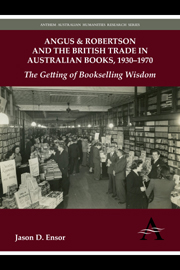 Angus & Robertson and the British Trade in Australian Books, 1930–1970
Angus & Robertson and the British Trade in Australian Books, 1930–1970 Book contents
- Frontmatter
- Contents
- Dramatis Personae
- Preface
- Acknowledgements
- Chapter 1 The Company that Loved Australian Books
- Chapter 2 The Overseas Books in Australian Publishing History
- Chapter 3 Triangles of Publishing and Other Stories
- Chapter 4 The World is Made of Paper Restrictions
- Chapter 5 The First Salesman in London
- Chapter 6 The Getting of Bookselling Wisdom
- Chapter 7 Preparing for ‘Operation London’
- Chapter 8 The Shiralee in the North
- Chapter 9 A Commercial and Cultural Relationship
- Chapter 10 Tomorrow, When London Publishing Ended
- Chapter 11 A House is Rebuilt
- Chapter 12 The Hidden Parts of Publishing Fortune
- Chapter 13 Learning from a Distance
- Figures and Tables
- Notes
- Bibliography
- Index
Chapter 10 - Tomorrow, When London Publishing Ended
Published online by Cambridge University Press: 05 July 2013
- Frontmatter
- Contents
- Dramatis Personae
- Preface
- Acknowledgements
- Chapter 1 The Company that Loved Australian Books
- Chapter 2 The Overseas Books in Australian Publishing History
- Chapter 3 Triangles of Publishing and Other Stories
- Chapter 4 The World is Made of Paper Restrictions
- Chapter 5 The First Salesman in London
- Chapter 6 The Getting of Bookselling Wisdom
- Chapter 7 Preparing for ‘Operation London’
- Chapter 8 The Shiralee in the North
- Chapter 9 A Commercial and Cultural Relationship
- Chapter 10 Tomorrow, When London Publishing Ended
- Chapter 11 A House is Rebuilt
- Chapter 12 The Hidden Parts of Publishing Fortune
- Chapter 13 Learning from a Distance
- Figures and Tables
- Notes
- Bibliography
- Index
Summary
If it was a good [Australian] book then it just had to be published, and one way or another you'd find a way of doing it, sometimes by subsidy from the Commonwealth Government, sometimes by just doing it and breaking even or losing a bit and letting some other book pay for it.
[T]he directors of Angus & Robertson were, for the most part, book people who had probably not a great deal of skill or experience in running business enterprises in what was becoming a changing world. I think you would have to say that as far as business skills were concerned, they were a pretty unsophisticated lot.
Through a series of major shareholding-related manoeuvres beginning in 1958, New Zealand-born Walter Burns took up a position on the Angus & Robertson board in 1959 before being appointed managing director in February 1960. According to Craig Munro, George Ferguson ‘proposed that Burns be made director’ when the position was made vacant by the resignation of Don Walker (who never fully recovered from a stroke the previous year). Although Burns was widely acknowledged as a ‘financial bloke skilled in company affairs’ but ‘not a publisher or a bookseller’, Ferguson reasoned that ‘business being the jungle it is these days, it might be well to have this kind of advice on the Board’.
- Type
- Chapter
- Information
- Angus & Robertson and the British Trade in Australian Books, 1930–1970The Getting of Bookselling Wisdom, pp. 111 - 126Publisher: Anthem PressPrint publication year: 2012


